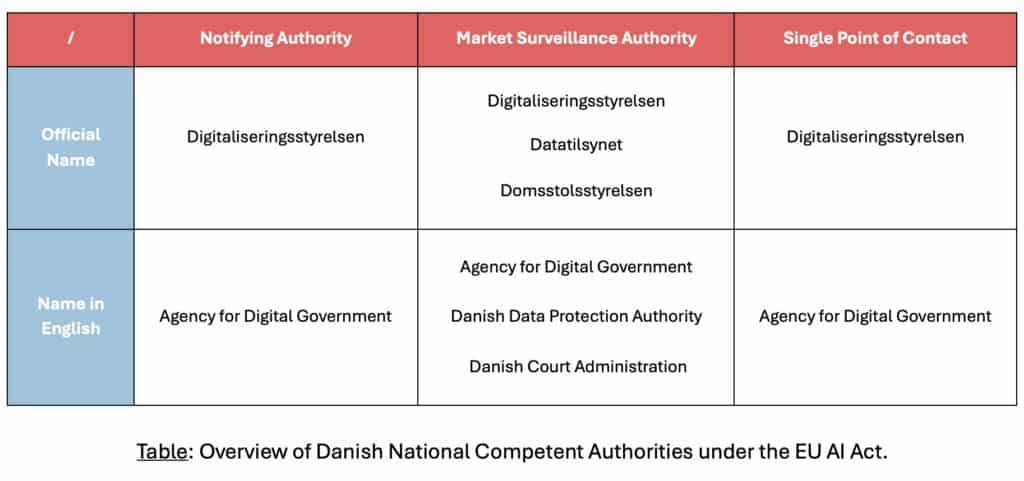On 8 May 2025, the Danish Parliament adopted a bill aimed at introducing additional provisions for the regulation of artificial intelligence in Denmark, in accordance with the European Regulation on Artificial Intelligence (EU AI Act). The text lays down the designation of national competent authorities (Articles 28 and 70 of the EU AI Act) and the penalties for violations of the EU AI Act, the law as well as related national legislation and implementing acts.
Pursuant to Article 70 of the EU AI Act, Member States are required to establish or designate their national competent authorities by 2 August 2025. Two types of national competent authorities have to be designated:
- Notifying authorities responsible for setting up and carrying out the procedures necessary for the assessment, designation, notification and monitoring of conformity assessment bodies[1]; and
- Market surveillance authorities responsible for ensuring market surveillance within the territory of the Member State that designates them to ensure that AI systems and AI models comply with the requirements set out in the EU AI Act[2].
Each Member State shall designate at least one notifying authority and one market surveillance authority. In addition, a market surveillance authority must be designated as the single point of contact for their counterparts in other Member States and the European Commission.
By way of background, a regulation in European Union law is a legislative act that is immediately applicable, which means that it becomes part of national law without the need for internal transposition. The adopted text is therefore not a transposition act, but a law aimed at enabling the implementation and application of the EU AI Act by organising the governance framework at national level and the criminal sanctions regime.
Danish governance framework
Denmark structures its governance framework around three national competent authorities as follows:
- Notifying authority:
- Market surveillance authorities:
- Agency for Digital Government – Digitaliseringsstyrelsen
- Danish Data Protection Authority – Datatilsynet
- Danish Court Administration – Domsstolsstyrelsen
- Single point of contact:

The Danish legislator has chosen a centralised governance framework, designating a limited number of authorities and relying exclusively on existing institutions, and a generalist approach, opting for authorities with general competence and no sectoral specialisation (transport, health, etc.).
The text also provides preliminary guidance on the powers, tasks and organisation of the competent national authorities.
Penalties
The text specifies the rules on criminal penalties depending on the nature of the infringement, which are exclusively financial in nature, and also addresses criminal liability and the limitation period (five years).
Entry into force
This Act shall enter into force in Denmark on 2 August 2025, in accordance with the provisions of Article 113 of the EU AI Act, with the exception of the Faroe Islands and Greenland, where the text does not apply.
This adoption makes Denmark one of the first Member States to adopt legislation implementing the provisions of the EU AI Act, which will enter into force on 2 August 2025. Denmark is therefore, with regards to the designation of competent national authorities, in line with the EU AI Act timetable.
To consult the adopted text (in Danish), click here.
To consult the legislative file for the adopted text (in Danish), click here.
To consult the draft bill submitted by the Danish Ministry of Digitalisation (in Danish), click here.
To stay informed about the next bills issued by the Member States to implement the EU AI Act, visit our website at AI-Regulation.com and follow us on LinkedIn, Twitter and Facebook.
S.P
[1] Articles 3(19) of the EU AI Act
Article 28 of the EU AI Act
[2] Article 70 of the EU AI Act
Regulation (EU) 2019/1020

